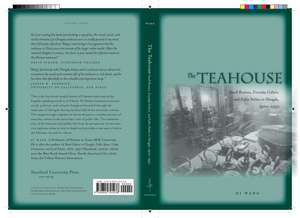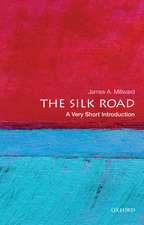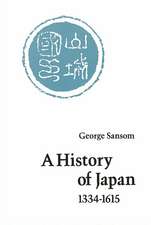The Teahouse: Small Business, Everyday Culture, and Public Politics in Chengdu, 1900-1950
Autor Di Wangen Limba Engleză Paperback – 30 sep 2013
This is the first book-length history of Chinese teahouses in the English-speaking world or in China. The Teahouse examines economic, social, political, and cultural changes as funneled through the teahouses of Chengdu during the first half of the twentieth century. The images brought together in this work paint a complete picture of everyday culture in the most basic unit of public life. This microhistorical examination of the teahouse and public life takes us into the heart of a city to explore urban society in depth, and provides a new way to look at the Chinese city and at daily life.
| Toate formatele și edițiile | Preț | Express |
|---|---|---|
| Paperback (1) | 233.37 lei 6-8 săpt. | |
| Stanford University Press – 30 sep 2013 | 233.37 lei 6-8 săpt. | |
| Hardback (1) | 707.44 lei 6-8 săpt. | |
| Stanford University Press – 10 iun 2008 | 707.44 lei 6-8 săpt. |
Preț: 233.37 lei
Nou
Puncte Express: 350
Preț estimativ în valută:
44.66€ • 46.36$ • 37.24£
44.66€ • 46.36$ • 37.24£
Carte tipărită la comandă
Livrare economică 22 martie-05 aprilie
Preluare comenzi: 021 569.72.76
Specificații
ISBN-13: 9780804791038
ISBN-10: 0804791031
Pagini: 376
Dimensiuni: 152 x 229 x 25 mm
Greutate: 0.54 kg
Editura: Stanford University Press
Colecția Stanford University Press
ISBN-10: 0804791031
Pagini: 376
Dimensiuni: 152 x 229 x 25 mm
Greutate: 0.54 kg
Editura: Stanford University Press
Colecția Stanford University Press
Recenzii
"Wang Di's The Teahouse is an extensively researched and detailed description of public life in Chengdu that touches upon many aspects of Chinese urban history in the first half of the twentieth century."—Toby Lincoln, CHINA REVIEW INTERNATIONAL
"Well written and free of distracting jargon, the book is a pleasure to read."—Richard Belsky, American Historical Review
"The appealing aspect of the book is that it also draws attention to the larger urban context of the city .... By focusing on the teahouse, the author enables us to understand concretely the dynamics of the city's small industries that have been little touched upon by current scholarship."—Tomoko Shiroyama, International Journal of Asian Studies.
"Di Wang's pioneering and well-researched study of the teahouse...links together the seemingly disparate issues of small business practices, everyday life, and public politics."—Joshua H. Howard, Harvard Journal of Asiatic Studies
"Wang makes a significant contribution with his microstudy of an old and ubiquitous social, business, and cultural institution in Chengdu."—CHOICE
"Wang's familiarity with Chengdu history and its archival sources allows him to examine the social and economic life of the teahouse in rich detail, and he has done that splendidly in this valuable and important study." —Joseph W. Esherick, University of California, San Diego
"As I was reading this book, and drinking a cup of tea, the visual, aural, and tactile elements of a Chengdu teahouse were so vividly present in my mind that I felt quite refreshed. Wang is convincing in his argument that the teahouse in China was a microcosm of the larger urban world. Often the material delights or amazes. You have in your hands the definitive book on the Chinese teahouse!" —David Strand, Dickinson College
"This text presents a monumental amount of new and detailed information in regard to that most ubiquitous of Chengdu institutions, the teahouse. Wang brings us closer to the flavor and tenor of daily life in a major Chinese city than we have ever been before." —Bradly W. Reed, University of Virginia
"Wang's familiarity with Chengdu history and its archival sources allows him to examine the social and economic life of the teahouse in rich detail, and he has done that splendidly in this valuable and important study." —Joseph W. Esherick, University of California, San Diego
"As I was reading this book, and drinking a cup of tea, the visual, aural, and tactile elements of a Chengdu teahouse were so vividly present in my mind that I felt quite refreshed. Wang is convincing in his argument that the teahouse in China was a microcosm of the larger urban world. Often the material delights or amazes. You have in your hands the definitive book on the Chinese teahouse!" —David Strand, Dickinson College
"This text presents a monumental amount of new and detailed information in regard to that most ubiquitous of Chengdu institutions, the teahouse. Wang brings us closer to the flavor and tenor of daily life in a major Chinese city than we have ever been before." —Bradly W. Reed, University of Virginia
Notă biografică
Di Wang is Professor of History at Texas A&M University. He is also the author of Street Culture in Chengdu: Public Space, Urban Commoners, and Local Politics, 1870-1930 (Stanford, 2003).
Descriere
This study examines economic, social, political, and cultural changes as funneled through the teahouses of Chengdu during the first half of the twentieth century.











